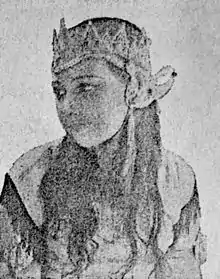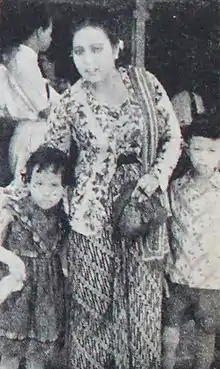Elly Yunara
Elly Joenara (Perfected Spelling: Elly Yunara; 3 November 1923 – 30 May 1992) was an Indonesian film actress who later became a producer. She was the wife of producer Djamaluddin Malik.
Elly Yunara | |
|---|---|
 Yunara in one of the scenes from Tjioeng Wanara (1941) | |
| Born | 3 November 1923 |
| Died | 30 May 1992 (aged 68) Jakarta, Indonesia |
| Education | Elementary school |
| Occupation | Actress, producer |
| Years active | 1940–1980s |
Notable work | |
| Spouse(s) | Djamaluddin Malik |
Biography
Joenara was born in Straits Settlements (modern-day Singapore) on 3 November 1923. She completed an elementary education at a Hollandsch-Inlandsche School, a Dutch-run school for pribumi students, the Dutch East Indies.[1]
Joenara made her film debut in Pah Wongso Pendekar Boediman, a 1940 detective film produced and directed by Jo Eng Sek of Star Film. In the film she played Siti, the romantic partner of a character portrayed by Mohamad Arief.[2] She remained with the company for its further productions, including Tjioeng Wanara (from a Sundanese legend), Lintah Darat, and Ajah Berdosa.[1] By 1942 she is recorded as acting in one film produced by Tan's Film under Tan Khoen Yauw, Aladin dengan Lampu Wasiat (Aladdin and the Magic Lamp).[3]
The Japanese occupied the Indies in March 1942, closing all but one film studio in the colony. Production of Aladin dengan Lampu Wasiat stopped; the film would only be released in 1950, after the occupation and national revolution.[4] During the occupation Yunara acted in theatre, going from troupe to troupe; she was part of the troupes Warnasari, Matahari, and Jawa Ehai.[1] By 1949, when the Dutch recognised an independent Indonesia, Yunara had married stage manager turned film producer Djamaluddin Malik.[5]

In 1950 Djamaluddin established a film company, Persari.[5] Yunara completed two films for the company as an actress: Si Mientje in 1952 and Siapa Ajahku in 1954. However, her main role was managerial.[6] Much of her time was spent as a housewife.[7]
Djamaluddin died on 8 June 1970, leaving Yunara a widow.[8] She soon established her own company, Remaja Ellyanda Film, and in 1972 began a career as a film producer with Malin Kundang.[1] Directed by D. Djajakusuma and based on a Malay folk tale, the film starred Rano Karno and Putu Wijaya as the titular Malin Kundang, a young man who forgets his roots after spending much of his childhood at sea.[9] This was followed by Jembatan Merah (1973), Petualang Cilik (1977), and Halimun (1979); the company also produced two non-feature films.[6] In 1974 she received an award from Governor of Jakarta Ali Sadikin for her contributions to film.[1]
Yunara died in Jakarta on 30 May 1992.[6]
References
- Biran 1979, p. 159.
- Biran 2009, p. 246.
- Filmindonesia.or.id, Aladin.
- Biran 2009, p. 214.
- Apa Siapa 1999, p. 154.
- Apa Siapa 1999, p. 175.
- Anwar 2002, p. 148.
- Biran 1979, p. 139.
- Filmindonesia.or.id, Kredit Lengkap.
Works cited
- "Aladin dengan Lampoe Wasiat". filmindonesia.or.id (in Indonesian). Jakarta: Konfiden Foundation. Archived from the original on 27 July 2012. Retrieved 27 July 2012.
- Anwar, Rosihan, ed. (2002). In Memoriam: Mengenang yang Wafat [In Memoriam: Remembering Those Who Have Died] (in Indonesian). Jakarta: Kompas. ISBN 978-979-709-029-6.CS1 maint: ref=harv (link)
- Apa Siapa Orang Film Indonesia [What and Who: Film Figures in Indonesia] (in Indonesian). Jakarta: Indonesian Ministry of Information. 1999. OCLC 44427179.
- Biran, Misbach Yusa, ed. (1979). Apa Siapa Orang Film Indonesia 1926–1978 [What and Who: Film Figures in Indonesia, 1926–1978] (in Indonesian). Sinematek Indonesia. OCLC 6655859.CS1 maint: ref=harv (link)
- Biran, Misbach Yusa (2009). Sejarah Film 1900–1950: Bikin Film di Jawa [History of Film 1900–1950: Making Films in Java] (in Indonesian). Jakarta: Komunitas Bamboo working with the Jakarta Art Council. ISBN 978-979-3731-58-2.CS1 maint: ref=harv (link)
- "Kredit Lengkap" [Full Credits]. Filmindonesia.or.id (in Indonesian). Konfidan Foundation. Archived from the original on 10 August 2012. Retrieved 10 August 2012.
Further reading
- K. H., Ramadhan; Budiarto, Nina Pane (2006). Pengusaha, Politikus, Pelopor Industri Film Djamaludin Malik [Djamaludin Malik: Businessman, Politician, and Film Industry Pioneer]. Jakarta: Kata. ISBN 978-979-1056-02-1.